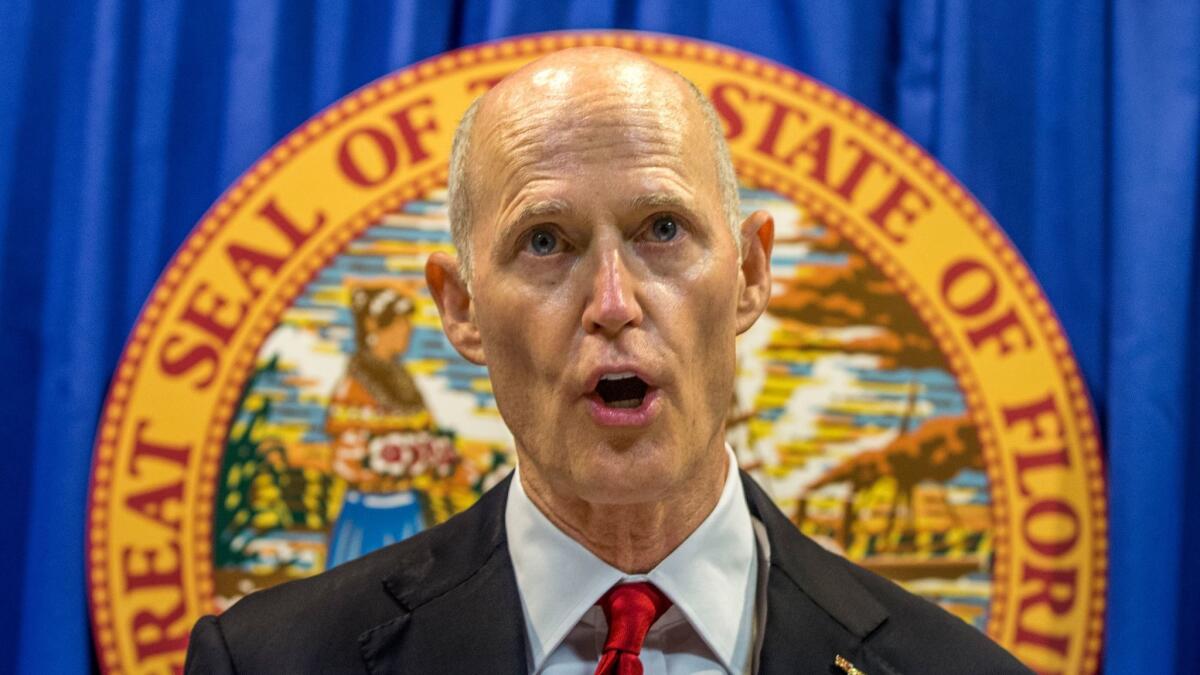Opinion: Small steps toward better gun control after Parkland could be cause for hope

- Share via
Could it be that hell has frozen over?
Republican Florida Gov. Rick Scott — as NRA-hugging as the worst of them — said Friday morning that he would push gun reforms in his state to raise the minimum age for buying firearms to 21, ban bump stocks, the devices that turn semiautomatic weapons into near-automatic, and bar those deemed a risk to themselves or others from possessing a gun, and other related restrictions.
Granted, the moves are pretty limited, and echo some of President Trump’s recent policy shifts (though Scott opposes Trump’s idea to arm teachers), but it’s a start for a politician who has long followed the National Rifle Assn.’s lead.
It’s unclear how much of his change of heart arose from the striking political activism of students who survived the Valentine’s Day massacre at Marjory Stoneman Douglas High School in Parkland, Fla., but they have certainly turned up the heat on the debate (which they need to convert into vote-mobilization).
The even better news is that Scott is not alone. Even as Congress refuses to slip off the gun lobby’s leash, political leaders in several states say they’ll push for more controls. New Jersey’s recently installed Democratic governor, Phil Murphy, said he plans to form a coalition of like-minded governors to take a regional state-level approach to try to get a handle on the nation’s gun-violence problem — a tactic loosely patterned after state responses to fight climate change after President Trump decided to withdraw the U.S. from the Paris agreement. He also has said he would sign a menu of gun-control measures that former Gov. Chris Christie vetoed.
Has the tide turned on the NRA and the gun lobby?
In Vermont, long one of the nation’s gun-friendliest states, Republican Gov. Phil Scott reversed his prior opposition to tightening gun laws, and called for measures that would increase to 21 the age at which someone can buy a firearm (unless they have passed a training course), ban bump stocks, allow police to temporarily remove firearms from someone deemed dangerous, and said he would consider requiring a background check for private sales of firearms and banning high-capacity magazines.
The catalyst: The arrest of an 18-year-old Vermont man who police say was planning a mass shooting at his former high school just days after the slaughter in Parkland.
Remarkably, U.S. Rep. Tim Walz (D-Minn.), long a favorite of the NRA, announced that he would seek a ban on semiautomatic rifles in Minnesota, where he is running for governor. That position flip likely has more to do with his political ambitions than a true change of heart, but it’s still progress.
And it needs to continue.
Another encouraging sign: Over the last couple of days, a number of businesses that work with the NRA have severed their connections. Enterprise Holdings will end a special rate program for NRA members renting cars through Enterprise, Alamo and National. A private Omaha bank said it will end co-branded NRA credit cards. MetLife said it would drop a policy discount for NRA members. And Chubb Ltd. decided three months ago that it would stop underwriting insurance that covered NRA members for legal problems arising from self-defense shootings.
Has the tide turned on the NRA and the gun lobby? It’s too soon to say, but these are heartening developments. Let’s hope the momentum builds.
Follow my posts and re-tweets at @smartelle on Twitter.
More to Read
A cure for the common opinion
Get thought-provoking perspectives with our weekly newsletter.
You may occasionally receive promotional content from the Los Angeles Times.










